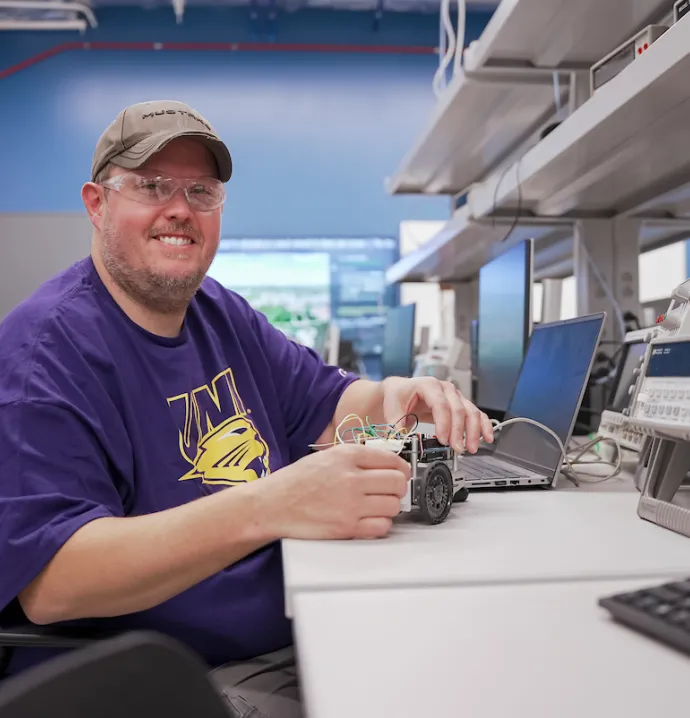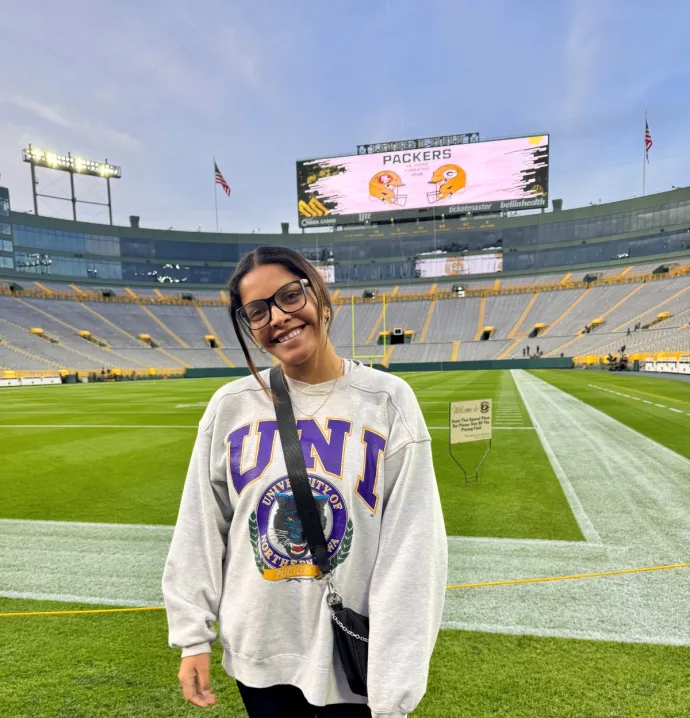After overcoming rare cancer, UNI alum wins prestigious fellowship
After overcoming rare cancer, UNI alum wins prestigious fellowship
A UNI alum has overcome a rare jaw cancer and years of reconstructive surgeries to achieve her goal of becoming a biochemist, and has topped it off by earning a prestigious research fellowship and mentoring underrepresented students.
Cassandra Hayne (‘11), a double major in biology and biochemistry who started her research career as an undergraduate, credits her UNI professors with supporting her. She underwent multiple surgeries starting in her freshman year to correct disfigurement that her childhood cancer treatments caused.
Yet Hayne, 31, looks at her trials, including growing up “looking different than everyone else” — she had asymmetrical facial features — and dealing with the resulting self-confidence issues, as the reason she persevered.
“It’s part of my personality,” she said. “When you’re passionate about something, it’s easier to have resilience.”
UNI professors recalled Hayne’s passion to one day work in research and were not surprised by the success she’s achieved. “Cassandra was the first research student that I ever had that knew exactly what and where she wanted to be in 10 years,” said David McClenahan, associate professor of biology. “It appears that she was absolutely correct in her prediction!”
Hayne knew since childhood that she thought biology, science and chemistry were “very cool.”
“For some reason, I knew what biochemistry was,” she said. “I wanted to do it in an impactful way.”
She has realized that ambition by becoming a Ph.D. biochemist, and now, a researcher awarded the new Maximizing Opportunities for Scientific and Academic Independent Careers (MOSAIC K99/R00) career transition award from the National Institute of General Medicine. The institute is a branch of the National Institutes of Health.
The award comes with a grant that will help fulfill another of Hayne’s passions — researching diseases that affect children with the aim of reducing the burden of disease on children.
Hayne is a postdoctoral fellow at the National Institute of Environmental Health Sciences in Research Triangle Park, North Carolina. She is studying RNA processing factors linked to rare neurodevelopmental and neurodegenerative diseases.
She spends most of her time in a lab studying tRNA, which regulates certain biological processes and delivers the building blocks of a person’s proteins to the protein-building machines in cells. Hayne’s work involves purifying the proteins and seeking to better understand how protein complexes work.
Hayne credits UNI’s small size with enabling her to get to know her professors and learn the important foundational skills needed to be a researcher. It also enhanced Hayne’s prior work, which occurred when a member of her cancer treatment team — a pediatric oncologist —learned of her interest in science and invited her to work in the oncologist’s lab when she was old enough. Hayne did just that, at age 16.
“Having the opportunity to do research for four years (at UNI) was absolutely fantastic,” Hayne said.
And though Hayne had to have surgeries nearly every holiday break, she threw herself into extracurricular activities at UNI. In addition to her research, she earned honors and served as president of the TriBeta Biology Honors Society; tutored in biology and biochemistry and helped in chemistry lab courses; worked as a Resident Assistant (RA) for three years; served in student government; was a photographer for the Northern Iowan; was active with Model UN; participated in Habitat for Humanity; and helped with the Halloween haunted house and a homecoming parade as a volunteer and leader in the American Cancer Society affiliate for the UNI chemistry department.
She said she also was profoundly impacted by tutoring UNI students from all backgrounds, regardless of their ability to pay for a tutor. The experience opened Hayne’s eyes to the fact that students from lower socioeconomic backgrounds are underrepresented in science professions.
“I learned that people learn in different ways, so you have to approach mentoring differently,” she said. “It has made me a better mentor now.”
After Hayne was graduated from UNI, she earned her doctorate in biochemistry at the University of North Carolina at Chapel Hill.
She still makes it a priority to mentor undergraduate students who she recruits through programs aimed at helping underrepresented students from diverse backgrounds.
And Hayne now acts as a role model herself. She visits K-12 classes to talk about her work and to let students see a female scientist.
“The idea is to let the students know what being a scientist is like,” she said. “And to know that you're approachable and that you're not a stereotype.”
Her goal is to start her own lab — one that’s inclusive and where research fellows “feel they have a community.”
Just as Hayne always wanted.




